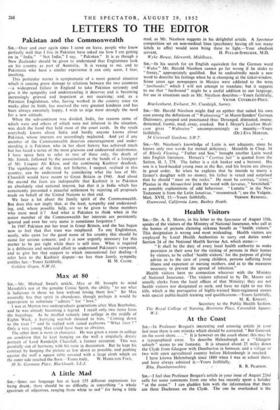LETTERS TO THE EDITOR Pakistan and the Commonwealth
-Slit,--Over and over again since I came on leave, people who know perfectly well that I live in Pakistan have asked me how I am getting on in " India." " Not India," I say. " Pakistan." It is as though a New Zealander should be given to understand that Englishmen look on his country as part of Australia. It is vexing to me, and to Pakistanis who have a similar experience it can only seem, I fear, insulting.
This particular matter is symptomatic of a more general situation which is causing grave damage to relations between the two countries —a widespread failure in England to take Pakistan seriously and give it the sympathy and understanding it deserves and is becoming increasingly grieved and impatient at not receiving; and, as a Pakistani Englishman, who, having worked in the country since six weeks after its birth, has received the very greatest kindness and has been always extremely happy, I wish to urge most strongly the need for a new attitude.
When the sub-continent was divided, India, for reasons some of which were and others of which were not inherent in the situation, was dealt the hand that held most of the court cards. In the result everybody knows about India and hardly anyone knows about Pakistan, whose interests are accordingly neglected. And yet if any member of the Commonwealth deserves encouragement and under- standing it is Pakistan, who in her short history has achieved much but has faced a series of the most grievous and undeserved misfortunes. I have space here to refer to two of these only, the death of Mr. Jinnah, followed by the assassination at the hands of a foreigner of Mr. Liaquat Ali Khan, and the continuing Kashmir deadlock. The significance of the first, not hitherto, I suspect, realised in this country, can be understood by considering what the loss of Mr. Churchill would have meant to Great Britain in 1940. And about the second the facts are indisputable that Kashmir is to Pakistan an absolutely vital national interest, but that it is India which has consistently prevented a peaceful settlement by rejecting all proposals made on behalf of the United Nations to that end.
We hear a lot about the family spirit of the Commonwealth. But does this not imply that, at the least, sympathy and understand- ing, and, where possible, help, are to be given to those members who most need it ? And what is Pakistan to think when in the senior member of the Commonwealth her interests are persistently ignored and even her very name is sometimes forgotten ?
In 1947 Pakistan put her trust in Great Britain, and she has begun now to feel that that trust was misplaced. To any Englishman, surely, who cares for the good name of his country this should be cause for serious concern; and it is now urgently necessary for this matter to be put right while there is still time. What is required is a deliberate and sustained effort to understand Pakistan's viewpoint, and to give her that support to which international fair dealing—I refer here to the Kashmir dispute—no less than family sympathy


































 Previous page
Previous page